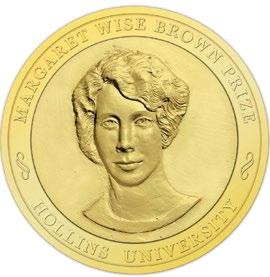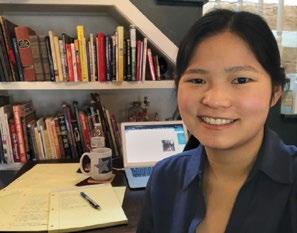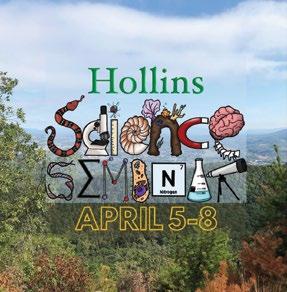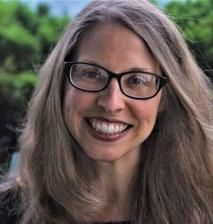
24 minute read
Hollins Magazine Vol. 71, No April - June 2021
IN THE Loop
Hollins Makes Plans for Fall 2021
Hollins has announced the initial measures the university plans to put into effect regarding campus life when classes resume this fall.
Students will be expected to be in residence for the 2021-22 academic year, courses will be taught in person, and vaccination for COVID-19 will be required for all campus community members.
“In many respects, we foresee the beginning of a return to normal while maintaining our focus on the health and well-being of our community,” said President Mary Dana Hinton.
Hollins is continuing to explore how it will adapt for the 2021-22 academic year its Culture of Care, which has guided the university’s response to the COVID-19 pandemic since March 2020. “We anticipate there will still be CDC and Virginia Department of Health requirements related to physical distancing, especially in our indoor spaces, and masks may continue to be required in certain situations or environments,” Hinton noted. “Our overall goal, however, is to return as much as possible to the regular campus schedule and interactive community we knew at Hollins prior to the pandemic.”
Reinstating the residential requirement for undergraduate students, which was suspended during 2020-21, “will promote regular, in-person contact with others in the Hollins community and allow us to provide the best educational setting possible,” said Hinton. “Possible exceptions to this requirement will be considered based on complexities and barriers related to international travel and for certain specific medical conditions.”
At the same time, Hinton explained, “we know that in-person instruction and interaction between professors and classmates provides the richest educational benefits for our students. As such, and in keeping with prepandemic practice, courses will be taught in person, with many incorporating some of the technological enhancements learned over the current academic year.” She said that Hollins recognizes the benefits of online instruction “when it can be delivered with pedagogical excellence. As such, we are considering supporting a limited number of requests for courses that could be delivered virtually.”
Hinton emphasized that the vaccination of students, faculty, and staff is critical to the university’s ability to continue meeting its highest priority since the pandemic began — maintaining the health and well-being of all members of the campus community. “With the availability of safe and effective vaccines, many at Hollins are already or will soon be vaccinated. Within this context, and in support of being in residence with an active university community, all students and employees will be required to provide proof of full vaccination in order to return to campus in the fall.” She added that exemptions for medical/disabilityrelated or religious reasons may be requested.
Hollins is looking ahead to resuming competition for its athletic teams this fall in accordance with NCAA, ODAC, and public health guidance. The university is also planning to move toward a more regular slate of activities, performances, and events that will meet public health protocols and support a healthy environment on campus.
Princeton Review: Hollins Is Among Nation’s Top Colleges for Alumni Networking, Internships, Value
Hollins nationally has the #5 Best Alumni Network (Private Schools) and is 12th among the Best Schools for Internships (Private Schools), according to The Princeton Review’s Best Value Colleges for 2021.
The Best Alumni Network rankings are based on students’ ratings of alumni activity and visibility on campus, while the Best Schools for Internships are determined by students’ ratings of accessibility of internship placement at their school.
The education services company also selected Hollins as one of the nation’s top 200 colleges “for students seeking a superb education at an affordable price.”
The Princeton Review chose its Best Value Colleges based on data the company collected from its surveys of administrators at more than 650 colleges in 2019-20. The company also factored in data from its surveys of students attending the schools as well as PayScale.com surveys of alumni about their starting and mid-career salaries and job satisfaction figures.
In all, The Princeton Review crunched more than 40 data points to tally return-on-investment ratings of the colleges that determined its selection of the 200 schools for 2021. Topics covered everything from academics, cost, and financial aid to graduation rates, student debt, alumni salaries, and job satisfaction.
“The schools we name as our Best Value Colleges comprise only just over one percent of the nation’s four-year colleges,” noted Robert Franek, The Princeton Review’s editor-in-chief. “They are distinctive in their programs, size, region, and type, yet they are similar in three areas. Every school we selected offers outstanding academics, generous financial aid and/or a relative low cost of attendance, and stellar career services. We salute Hollins University for these exceptional offerings and recommend it highly to college applicants and parents.”
IN THE Loop
Standardized Test-Optional Policy Becomes Permanent
Hollins faculty have approved the permanent adoption of a test-optional admission policy for domestic students. ACT and SAT scores will no longer be required when applying for admission.
“Hollins strongly endorses a studentcentered, holistic approach to admission,” said Ashley Browning, vice president for enrollment management. She noted that if a prospective first-year student chooses to submit ACT or SAT scores, Hollins will continue to consider them as part of the student’s total application. However, “the absence of standardized test scores will not disadvantage any domestic student’s application for admission.”
Michael Gettings, dean of academic success, stated that the case for a testoptional admission policy is strong. “Students of color and students with fewer resources, both low-income and firstgeneration, tend to be disadvantaged by standardized test requirements, either because of the cost of the test, lack of access to test prep services, lower-resource schools, or other factors. National data indicate that students from these groups earn lower SAT scores, and are thus disproportionately represented among groups with lower scores.”
Gettings explained that even though few students have to date entered Hollins without test scores, “our analysis indicates that students with lower test scores historically perform well, with respect to Hollins GPA and graduation rates, nearly the same as the overall student population.”
Hollins assesses many aspects of a student’s application to determine their academic preparedness for the university. This includes the high school transcript; course rigor; Advanced Placement, Dual Enrollment, International Baccalaureate and other advanced coursework; GPA; class rank; required essay; and recommendations. “These are all good indicators that allow the Office of Admission to judge academic readiness,” said Gettings, “and again, our data show that these are reliable predictors of academic success at Hollins.”
Browning added that Hollins’ decision reflects a broader trend in higher education. “Many schools have gone test-optional during the global pandemic, and many are making that change permanent in order to make the application process more equitable for students from all backgrounds.”
Last August, Hollins joined more than 500 college and university members of the National Association for College Admission Counseling in confirming that students would not be penalized for the absence of a standardized test score for admission in Fall 2021. The policy was intended to alleviate uncertainty for students and families as they weighed concerns about the safety of going to test centers or the feasibility of testing from home due to COVID-19.
Evelyn Del Rey Is Moving Away Captures 2021 Margaret Wise Brown Prize in Children’s Literature
Newbery Medalist and New York Times bestselling author Meg Medina is the winner of the sixth annual Margaret Wise Brown Prize in Children’s Literature.
Medina will receive an engraved medal and a $1,000 cash prize for Evelyn Del Rey Is Moving Away, a story of friendship and change illustrated by Sonia Sánchez and published by Candlewick Press.
“Evelyn Del Rey Is Moving Away is all at once poignant and hopeful, poetic but utterly child-centered,” the judges for this year’s prize stated. “From the moment you meet the moving truck ‘with its mouth wide open’ you know you’re in their world — these nearly twin mejor amigas who are having to say goodbye. Medina and Sánchez make the experience — even the really sad parts — sing.”
Medina’s other books include Merci Wind, a 2012 Bank Street College Best Children’s Book of the Year.
Hollins established the Margaret Wise Brown Prize in Children’s Literature as a way to pay tribute to one of its bestknown alumnae and one of America’s most beloved children’s authors. The cash prizes are made possible by an endowed fund created by James Rockefeller, Brown’s fiancé at the time of her death.
“The Margaret Wise Brown Prize is one of the few children’s book awards that has a cash prize attached,” said Lisa Rowe Fraustino, director of the graduate programs in children’s literature at Hollins.
The engraved medal presented to the winners was conceived by award-winning sculptor, painter, and Hollins alumna Betty Branch ’79, M.A.L.S. ’87 of Roanoke.
Suárez Changes Gears, the 2019 John Newbery Medal winner; Burn Baby Burn, long-listed for the 2016 National Book Award; and The Girl Who Could Silence the
IN THE Loop

“I Was Home but Still Getting This Incredible Opportunity”: Students Earn Career Experience Through Remote Internships
McDonald
Normally, each year, many Hollins students spend their January Short Term living and working in New York City, Washington, D.C., or other locations around the country as part of the university’s Signature Internship Program. Sophomores, juniors, and seniors may apply for an array of internships offered by alumnae in various fields. In addition to gaining valuable career experience, students receive academic credit and a $300 stipend, and housing is often provided.
But in 2021, the COVID-19 pandemic presented a significant and unprecedented challenge to the program: How could students safely and successfully complete an internship at a time when social distancing, travel restrictions, and other protocols limiting personal contact are essential in mitigating the spread of the virus?
The Hollins University Center for Career Development and Life Design, bolstered by the support of alumnae and nearly 30 organizations, developed a viable and dynamic alternative.
“We realized early on that our students would have to engage in remote internships this year, so we provided best practices and other information to employers to help them build a framework. We knew this idea would be as new to our employers as it was for us,” said Center for Career Development and Life Design Coordinator Amber Becke. “We converted the majority of our existing internship employers, and even had quite a few organizations host multiple students during January. We were also pleased to reactivate some employers that we hadn’t partnered with in a few years.”
Forty-two students were placed in remote signature internships this January, working in technology, legislation, publishing, research, and marketing and communications. The Center for Career Development and Life Design readied them for what to expect. “We provide orientation sessions each year, but this year we put particular focus on remote work practices and preparation for the remote world,” Becke explained. “Prior to Short Term we regularly checked in with each of them to make sure they were comfortable with interning remotely and to assure them that we were here to support them throughout the month.”
Biology majors Mylah Johnson ’21 and Hana Olof ’22 were both seeking to build their medical research experience. While their remote internships kept them out of the labs at their respective employers, they were still able to participate in important work.
“I did so much, and it was nice to be in a constantly changing environment, because that’s the way medical research goes,” said Johnson. She interned with Michelle Watt ’93 at San Antonio-based Vascular Perfusion Solutions, which is working on a device to help transplanted organs last longer outside the body. “I helped present to the entire team of engineers, researchers, and CEOs a newly published scientific article that offered suggestions for their own research. I was also able to prepare some histology data for them. They sent me pictures of cells, and I took measurements of those pictures with my laptop. Some of the data I gathered will support their research paper, and I will get co-authorship on it.”
Olof interned with Atlanta Botanical Garden, which emphasizes plant conservation education and research. “I worked with seed banking and micropropagation (the multiplication and/or regeneration of plant material for transfer to the field),” she said. “It’s different from the field I’m used to, and I wanted to challenge myself and get to know more about why seed banking is needed. I wanted to learn how to design and conduct research.”
Olof performed research “on the shelf life of temperate versus tropical orchid seeds. It was fun to see how to organize data and do a statistical analysis in an actual scenario. It strengthened my interest in research.” Her work potentially will contribute to improvements in seed storage at Atlanta Botanical Garden.
Another facet of Olof’s internship is that she completed it half a world away in her home country of Ethiopia. “My supervisor was kind enough to take the time difference into consideration. We would always meet online at 10 a.m. (Eastern Time), which was 6 p.m. back home.” At the outset, her other concern was whether she could count on having a reliable internet connection throughout the month, “but it was more stable than I expected. On the days that it didn’t work for me, I would just go to an internet café or a hotel nearby and do my Zoom calls there.”
While Johnson and Olof knew going into their internships that they want to pursue medical research after graduating from Hollins, Molly Ward ’22, who is double-majoring in history and art history, saw her Short Term experience as a crucial step in discovering where she wants to go in her career. Ward interned with the White House Historical Association’s marketing and communications department.
“I applied for this internship not knowing anything about the field, and just wanting to see if it would potentially be something I would like to do after graduation, and I think it is,” she said. “I had a great experience.”
Ward researched the career of President Lyndon Johnson. She also performed a website review to find historical and grammatical errors and identify sections where the text could be improved. “This was awesome because I had no previous experience working on the back end of websites. I became very fluent in using a CMS (content management system).”
Despite not being able to be physically present at American Rivers in Washington, D.C., biology major Camryn Anderson ’21 still felt like she was very much a part of their team. “They welcomed me from day one as if I had worked for them for years. I was doing equity research on dam removal and restoring areas for impoverished or minority groups, and I was interviewing staff to learn about their experiences out in the field. Every single employee saw the interviews as a chance just to talk with me, to find out what I was doing, how they could help me, and who they could connect me with. I was at home but I was still getting this really incredible opportunity.”
English and political science major Claire Ross ’23 echoed the emphasis on collaboration in the office of Virginia State Senator Jennifer Boysko ’89. “The size of the team was perfect for me. It was Sen. Boysko herself, my supervisor, another legislative aide, and two other interns. I was remote, but I still got to work handson with legislation. I wrote press conference statements, media releases, and statements for committees to help pass bills.”
For Ming McDonald ’22, a communication studies major, her remote work with Children’s Hospital of Philadelphia this January has ably complemented her previous internships in helping her stand out while seeking future opportunities. “I was called about a possible summer internship, and I talked about the PR experience I’ve had through the Signature Internship Program. The people I spoke with were blown away with the amount of experience that I have from being a student at Hollins and the number of internships you can get here.”
She added, “I feel very confident that when I get my first job out of college and begin my career, it won’t be nearly as scary as it could have been because of the experience Hollins has offered.”
Center for Career Development and Life Design Director Christine Harriger believes a mix of face-to-face and remote internships holds promise for the future. “With, say, laboratory work, you need to be in person, but other activities can be done in a hybrid fashion. You can save on expenses and still deliver valuable career preparation.”
In addition, Harriger is grateful for the collaborations that helped make the remote internship approach a success. “We could not offer these kinds of opportunities without our fabulous hosts and our super-engaged alumnae. And we’re really proud of how well students responded to this format. They represented us really well. This is what makes Hollins Hollins.”
IN THE Loop
Hollins showcased dynamic projects conducted during the 2020-21 academic year by the university’s science and mathematics students at the 63rd Annual Science Seminar, April 5 - 8.
The four-day virtual meeting celebrated scientific research and inquiry through: •Student research presentations in both oral and poster formats •Separate student/faculty panels exploring research in biology/ environmental science, chemistry/ physics, mathematics/statistics/ computer science, and psychology •An alumnae panel focused on research in STEM fields •A keynote address
“Though we have been pressed by the pandemic, we have continued in our quest to expand our mathematical and scientific understanding of the world around us,” said Professor of Biology and Environmental Studies Renee Godard.
The seminar’s first day featured sessions considering the process and value of doing STEM research. During “Conversations about Research with Students of Science and Math,” student panelists discussed how they found research opportunities, described what lessons they learned and skills they gained during their research, and explained how this has prepared them for their future. “A Conversation with STEMinist Alumnae in Research” was led by recent Hollins alumnae who are actively pursuing careers in research in psychology, environmental science, biomedical technology, and chemistry.
On April 6, the Science Seminar highlighted research in biology/environmental science and mathematics/ statistics. “Exploring Research in Biology and Environmental Science” featured biology and environmental science faculty and students discussing their ongoing projects. Then, faculty and senior majors in the department of mathematics, statistics, and computer science talked about “Exploring Research in Math, Statistics, and Data Science.” A “Senior Research Presentations” session highlighted two Hollins seniors engaged in research projects at the intersection of biology, environmental science, and mathematics/statistics.
The Science Seminar’s third day was devoted to research in chemistry/

physics and psychology. “Exploring Research in Chemistry and Physics” featured chemistry and physics faculty in a conversation about their areas of research, followed by separate discussions with students presenting research posters. “Exploring Research in Psychology” focused on faculty research, student research posters, and various research opportunities for students. A second “Senior Research Presentations” session showcased two seniors’ projects in chemistry and psychology.
The 63rd Annual Science Seminar concluded on April 8 with a keynote presentation by Susan Campbell, Ph.D., an assistant professor of animal and poultry sciences at Virginia Tech.
IN THE Loop
Decision Height Revival Celebrates Ten Years of the Award-Winning Drama
“Oh my God, what am I going to write?” This was the question nagging then-junior Meredith Dayna Levy ’12, M.F.A. ’18, while she was studying abroad in London during the spring of 2011. For her senior honors thesis, the theatre major knew she wanted to write a play, one with an all-female cast that would allow her “to practically use the actors I knew on campus and also speak to my experience as a college student.” What she didn’t know was, what exactly was the play going to be about?
“I was beating myself up about it,” Levy recalled. per tradition. I thought, ‘This is something Hollins students are going to understand. We’re all about wacky traditions.’” But on a deeper level, Levy’s initial research told her that “even though I knew nothing about planes, the military, or physics, I decided this was a community that my audience of students and I could understand.”
Thus began Levy’s work on what would become the play Decision Height. The drama would have its Hollins Theatre Main Stage premiere in the fall of 2012, subsequently capture honors from the prestigious Kennedy Center American

All that changed when Levy learned that in 2009, the Congressional Gold Medal had been awarded to the Women Airforce Service Pilots (WASP), the first women ever to fly American military aircraft. Created in World War II to fly noncombat military missions in the U.S., the WASP program logged more than 60 million miles and flew virtually every kind of aircraft operated by the Army Air Force.
Levy subsequently found a newspaper article about one of the pilots after she had flown her first solo flight. “Her friends had dumped her into this wishing well College Theater Festival, and go on to be produced at high schools, colleges, and community theatres nationally. In April, Hollins Theatre gave Decision Height its first revival via a virtual staging.
Decision Height follows six women who arrive at a Texas base for nine months of training before moving on to active duty. “We witness how their relationships develop and the ways in which they learn new things about themselves and each other, what motivates them and what gives them purpose and strength,” Levy explained.
Professor Emeritus of Theatre Ernie Zulia, who was Levy’s advisor when she was an undergraduate, remembers when she first approached him prior to the 2011-12 academic year about writing a play as her honors thesis. “Not only was it sitting down and creating characters and dialogue,” Zulia said, “it also required intense research in order to do it authentically.”
Levy discovered an online collection of primary research materials compiled by Nancy Parrish, whose mother, Odean “Deanie” Bishop Parrish, was part of the WASP program. “I spent the summer after I came back from London just eating this stuff up. So many of the events in the play came out of that research and brought those stories to life. It can be intimidating when you’re faced with so many real people. How do you fictionalize it? You want to get every detail right.”
So Levy devoted the fall of 2011 to “doing draft after draft after draft.” Friends took part in readings “just trying to get the words out so that I could hear the play and determine what was missing or confusing. With each draft I took a further step away from the history and leaned more on my own lived experience and putting my own emotional truth into the play amongst all the historical framework.”
“When a play progresses to a certain point,” Zulia said, “it’s important to get it up on its feet so the playwright can see the play they’ve written.”
In February 2012, Decision Height went into rehearsals for its production that spring in Hollins’ Upstairs Studio Theatre, a venue designed for trying out new works. The staging “was received with such enthusiasm,” Zulia said. “People were in tears and talking about what an impact this play had on them.”
After graduating in 2012, Levy enrolled in Hollins’ M.F.A. in playwriting program. Zulia told her if she spent that summer working on rewrites, he would put Decision Height on Hollins Theatre’s Main Stage. She continued adding new elements to the play with support from Zulia, Director of the Playwright’s Lab at Hollins Todd Ristau, and Bob Moss, a member of the
Playwright’s Lab faculty who has been called a “living legend of Off-Off Broadway.”
For Decision Height’s Main Stage production that October, Zulia invited representatives from the Kennedy Center American College Theater Festival (KCACTF) Region IV, a program dedicated to improving the quality of college theatre in the U.S. In January 2013, KCACTF’s Region IV awarded its top playwriting honor to Levy.
A year later, Hollins and Roanoke’s Mill Mountain Theatre hosted the 2014 Region IV KCATCF and featured Decision Height as the opening event. “There were spontaneous standing ovations,” Zulia said. “The Kennedy Center representatives selected Decision Height as the top new play of the year, and the top production of a play that season.”
Decision Height has since reached broader audiences. Levy gets particular satisfaction from seeing it staged at colleges. “If it’s a single-sex environment, the actors are so excited — ‘This is me and my friends, this is our community.’ I expected that, but I’m also delighted when I go to big state schools and the women say, ‘There are so few parts for us in so many of the main stage productions. I’ve never viewed any of my peers as friends when we’re competing for the same five parts. To do an all-female production, I feel like I’ve built a new family.’ Hearing these students talk about how they had discovered this new way of being in community with women, that it didn’t have to be adversarial or competitive, was gratifying.”
Zulia sees the Decision Height revival as a logical continuation of Hollins Theatre’s Legacy Series, which began a decade ago as a way to bring literary pieces by Hollins writers to the stage.
“Our playwriting program is a big part of our legacy, along with our creative writing program,’” Zulia explained. “Some students came to me last year and asked, ‘When do we get to perform Decision Height?’, and it seemed like a good idea — let’s give our current students the opportunity to be a part of it. Its historical setting and themes are timeless.”
IN THE Loop

“It’s a Book That’s Very Close to Me”: Professor Jessie van Eerden Talks About Her Award-Winning Latest Work, Call It Horses
van Eerden
When it comes to writing, some projects are well worth the wait. Author and Associate Professor of English and Creative Writing Jessie van Eerden certainly understands that. Call It Horses, her third novel and fourth book and the winner of the 2019 Dzanc Books Prize, was eight years in the making.
“I didn’t work on it eight years consistently,” laughed van Eerden. “There were a lot of other things in that time, but this book took a lot of reimagining.” Call It Horses revolves around three women — niece, aunt, and artist stowaway — and the 1990 road trip that this improbable trio takes from West Virginia to New Mexico. Experimenting with the book’s structure, van Eerden first tried out a narrative poetry sequence, then a more traditional first-person plot, before finally settling on the current epistolary form (i.e., told through letters).
“I think the joy of publishing a book is seeing something that you’ve labored over come to fruition,” said van Eerden about the long process of writing Call It Horses. “To complete that circuit with readers, that circuit of something that’s lived in your head for so long, it’s pleasurable no matter what.”
In the end, all that hard work paid off for van Eerden. In 2019, she was named the winner of the coveted Dzanc Books Prize for Call It Horses — the manuscript was selected from a pool of hundreds — a win that resulted in Dzanc Books publishing Call It Horses. Flash forward a year and a half, and now van Eerden is out promoting her new novel. “It’s exciting because it’s a book that’s very close to me,” she said. “I’m always interested in letting my characters go out in the world and meet other people.”
Indeed, the novel does hit close to home for van Eerden. Call It Horses starts in Caudell, West Virginia, a small rural town reminiscent of van Eerden’s own upbringing in that same state. “It is interesting, my relationship to place with respect to my fiction,” she said. “I feel that there’s the physical landscape of where I grew up, and also the spiritual landscape: of the community of people and the tiny church and the ways that people interacted and cared for each other.” In Call It Horses, those two landscapes inform both van Eerden’s fictional Appalachian world as well as the quasi-spiritual journey out West undertaken by the three central characters.
Van Eerden is already working on her fifth book, a return to nonfiction and essay portraiture, a form that won her the Foreword INDIES Book of the Year Award for her 2017 portrait essay collection, The Long Weeping. “I’m planning on peering into some portraits of biblical women,” she said. “[I’m] doing a lot of excavation of biblical myth alongside more memoiristic material of my own narrative life — looking into the philosophical realm of human responsibility and human freedom, and the relationship between those two poles of existence.”


